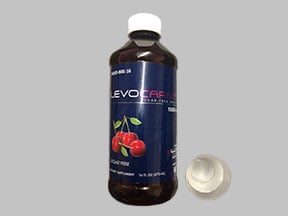
G-levocarnitine S/f Coupons & Savings Card – Discount Prices from $9.47
Brand for: Levocarnitine (dietary)
My prescription
Edit
473ML of 1GM/10ML, Levocarnitine (dietary) (1 Bottle)
Select pharmacy

Albertsons
$9.47
COUPON PRICE
Walgreens
$11.47
COUPON PRICEG-levocarnitine S/f savings card
Show this card to your pharmacist
Albertsons
$9.47
BIN
ID
PCN
GRP
019876
LHE09A0575
CHIPPO
LHX
Powered by
G-levocarnitine S/f (Levocarnitine (dietary)) dosage forms
Dosage Quantity Price from Per unit 473ML 1 Bottle $9.47 $9.47 473ML 2 Bottles $11.44 $5.72 473ML 3 Bottles $13.41 $4.47
| Dosage | Quantity | Price from | Per unit |
|---|---|---|---|
| 473ML | 1 Bottle | $9.47 | $9.47 |
| 473ML | 2 Bottles | $11.44 | $5.72 |
| 473ML | 3 Bottles | $13.41 | $4.47 |
What is the drug levocarnitine used for?
Levocarnitine is used to treat carnitine deficiency, which can occur in individuals with certain genetic disorders, kidney disease, or those undergoing dialysis. It helps the body produce energy by facilitating the transport of fatty acids into the mitochondria.
What is vitamin E and levocarnitine used for?
Vitamin E is an antioxidant that helps protect cells from damage and is used to support immune function, skin health, and prevent or treat vitamin E deficiency. Levocarnitine, also known as L-carnitine, is used to treat carnitine deficiency, which can occur in individuals with certain genetic disorders, on dialysis, or with other medical conditions. It helps the body produce energy by transporting fatty acids into the mitochondria of cells.
What is the drug carnitine used for?
Carnitine is used to help the body turn fat into energy. It is often used as a supplement in individuals with carnitine deficiency, which can occur due to genetic disorders, certain medical conditions, or as a result of some medications. It may also be used to support heart health, improve exercise performance, and aid in recovery from certain medical conditions.
What does levocarnitine do to your body?
Levocarnitine helps the body produce energy by facilitating the transport of fatty acids into the mitochondria, where they are oxidized to produce energy. It is essential for heart and brain function, muscle movement, and many other body processes.
Who cannot take carnitine?
Individuals with certain medical conditions or those taking specific medications should avoid taking carnitine without consulting a healthcare provider. This includes people with:1. Kidney disease or those on dialysis, as carnitine can accumulate in the body.2. A history of seizures, since carnitine may increase the risk of seizures in some individuals.3. Allergies to carnitine or any of its components.Additionally, pregnant or breastfeeding women should seek medical advice before using carnitine supplements. It's important for anyone considering carnitine supplementation to discuss it with their healthcare provider to ensure safety and appropriateness.
